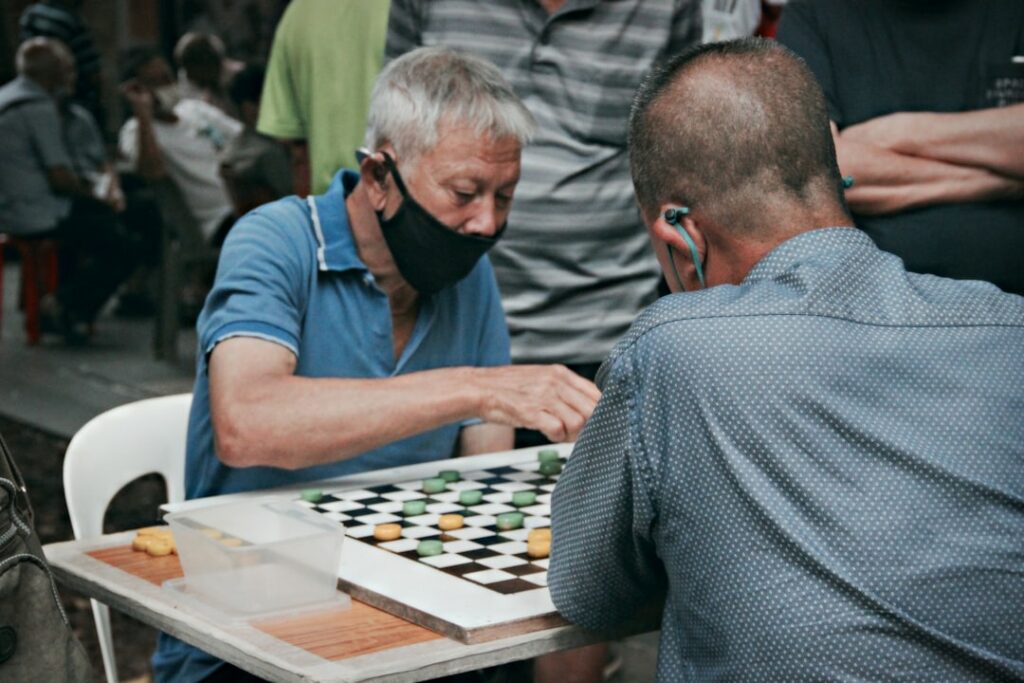Competitive brain games, also known as mind sports, are games that require mental skills and strategies to compete against opponents. These games challenge the brain and test various cognitive abilities such as memory, problem-solving, and critical thinking. Examples of competitive brain games include memory games, puzzle games, strategy games, and trivia games. In recent years, these games have gained popularity due to their ability to improve cognitive function and provide a fun and challenging way to exercise the brain.
The increasing popularity of competitive brain games can be attributed to several factors. Firstly, people are becoming more aware of the importance of maintaining mental fitness and keeping their brains active. As individuals strive to lead healthier lifestyles, they are seeking activities that not only provide entertainment but also offer mental stimulation. Competitive brain games offer a unique combination of entertainment and mental exercise, making them an appealing choice for many.
Additionally, the rise of technology has made these games more accessible than ever before. With the advent of smartphones and tablets, people can now play brain games anytime and anywhere. This convenience has led to a surge in the number of individuals engaging in competitive brain games. Furthermore, the emergence of online platforms and communities dedicated to brain games has created a sense of community among players, fostering competition and encouraging participation.
Key Takeaways
- Competitive brain games are becoming increasingly popular as a way to challenge and improve cognitive abilities.
- Brain game tournaments and competitions offer opportunities for players to showcase their skills and win prizes.
- Participating in competitive brain games can improve memory, attention, and problem-solving abilities.
- Types of competitive brain games include memory games, puzzle games, and strategy games.
- Popular brain game tournaments and competitions include the World Memory Championships and the USA Memory Championship.
The Rise of Brain Game Tournaments and Competitions
The history of competitive brain games can be traced back to ancient times when board games like chess were played as a test of intelligence and strategic thinking. However, it was not until the late 20th century that organized tournaments and competitions for brain games began to gain traction.
One of the earliest examples of a competitive brain game tournament is the World Memory Championships, which was first held in 1991. This annual event brings together participants from around the world to compete in various memory-related challenges such as memorizing numbers, names, and faces. The success of the World Memory Championships paved the way for other brain game tournaments and competitions to emerge.
In recent years, the popularity of brain game tournaments and competitions has grown significantly. These events attract participants of all ages and skill levels, from amateurs to professionals. The growth can be attributed to the increasing recognition of the benefits of participating in competitive brain games, as well as the rise of online platforms that allow for virtual competitions.
Benefits of Participating in Competitive Brain Games
Participating in competitive brain games offers a wide range of benefits for individuals of all ages. These games provide a fun and engaging way to exercise the brain and improve cognitive function. Here are some of the key benefits of participating in competitive brain games:
1. Improved cognitive function: Regular engagement in brain games has been shown to improve cognitive function, including memory, attention, and processing speed. These games challenge the brain and require it to work harder, leading to improvements in various cognitive abilities.
2. Increased mental agility: Competitive brain games require quick thinking and decision-making, which helps to improve mental agility. By constantly challenging the brain with new information and tasks, individuals can enhance their ability to think on their feet and adapt to changing situations.
3. Enhanced problem-solving skills: Brain games often involve solving puzzles or finding solutions to complex problems. By regularly engaging in these activities, individuals can develop their problem-solving skills and learn to approach challenges from different perspectives.
4. Boosted confidence and self-esteem: Successfully completing challenging brain games can boost confidence and self-esteem. As individuals overcome difficult tasks and achieve higher scores or rankings, they gain a sense of accomplishment and pride in their abilities.
Types of Competitive Brain Games
Competitive brain games come in various forms, each targeting different cognitive abilities. Here are some examples of the different types of competitive brain games:
1. Memory games: These games focus on improving memory skills by challenging players to remember and recall information. Examples include card matching games, number sequence memorization, and word recall challenges.
2. Puzzle games: Puzzle games require players to solve complex problems or complete a specific task. Examples include jigsaw puzzles, Sudoku, crossword puzzles, and logic puzzles.
3. Strategy games: Strategy games involve planning and decision-making to outwit opponents or solve complex problems. Examples include chess, Go, and strategic card games like poker.
4. Trivia games: Trivia games test general knowledge and require players to recall facts and information across various topics. Examples include quiz shows, trivia board games, and online trivia competitions.
Popular Brain Game Tournaments and Competitions
There are several notable brain game tournaments and competitions that attract participants from around the world. These events showcase the skills and abilities of top players in various competitive brain games. Here are some of the most popular brain game tournaments and competitions:
1. World Memory Championships: The World Memory Championships is an annual event that brings together participants from around the world to compete in memory-related challenges. The competition includes tasks such as memorizing numbers, names, faces, and abstract images.
2. USA Memory Championship: The USA Memory Championship is a national competition held annually in the United States. Participants compete in memory-related challenges similar to those in the World Memory Championships.
3. International Sudoku Championship: The International Sudoku Championship is an annual event that brings together top Sudoku players from around the world. Participants compete in solving Sudoku puzzles within a given time limit.
4. World Puzzle Championship: The World Puzzle Championship is an annual event that tests participants’ puzzle-solving skills across various categories such as crosswords, logic puzzles, and spatial reasoning challenges.
How to Prepare for Competitive Brain Games

Preparing for competitive brain games requires both mental and physical preparation. Here are some strategies to help individuals prepare for these competitions:
1. Mental and physical preparation: Engaging in regular mental exercises such as brain games and puzzles can help improve cognitive function and mental agility. Additionally, maintaining a healthy lifestyle through regular exercise, proper nutrition, and sufficient sleep can enhance overall brain health.
2. Practice and training: Regular practice is essential to improve skills and performance in competitive brain games. Setting aside dedicated practice time each day can help individuals develop strategies, improve speed, and enhance problem-solving abilities.
3. Developing a routine: Establishing a routine that includes regular practice sessions, rest periods, and mental relaxation techniques can help individuals prepare for competitive brain games. Having a structured routine can improve focus, concentration, and overall performance.
Strategies for Winning Brain Game Tournaments and Competitions
Winning brain game tournaments and competitions requires a combination of mental strategies and techniques. Here are some strategies that can help individuals increase their chances of success:
1. Focus and concentration: Maintaining focus and concentration is crucial in competitive brain games. Minimizing distractions, practicing mindfulness techniques, and developing the ability to block out external stimuli can help improve focus during competitions.
2. Time management: Time management is essential in brain game tournaments where participants are often given a limited amount of time to complete tasks. Developing efficient time management skills can help individuals maximize their performance within the given time frame.
3. Visualization techniques: Visualization techniques involve mentally rehearsing tasks or strategies before executing them. This technique can help improve performance by enhancing mental preparation and reducing anxiety or stress.
4. Utilizing memory techniques: Memory techniques such as mnemonic devices, visualization, and association can be valuable tools in competitive brain games that require memorization. These techniques can help individuals remember information more effectively and improve their performance in memory-related challenges.
Challenges Faced in Competitive Brain Games
Competitive brain games come with their own set of challenges that participants must overcome to succeed. Here are some common challenges faced in competitive brain games:
1. Pressure and stress: The pressure to perform well in competitive brain games can lead to increased stress and anxiety. Managing stress levels and developing coping mechanisms can help individuals perform at their best under pressure.
2. Mental fatigue: Engaging in intense mental activities for extended periods can lead to mental fatigue. Taking regular breaks, practicing relaxation techniques, and maintaining a healthy lifestyle can help combat mental fatigue and maintain optimal performance.
3. Distractions and interruptions: Competing in brain game tournaments often involves dealing with distractions and interruptions from the environment or other participants. Developing the ability to stay focused and block out distractions is crucial in maintaining concentration during competitions.
Future of Competitive Brain Games
The future of competitive brain games looks promising, with the potential for growth and expansion. As more research highlights the benefits of engaging in brain games, the demand for competitive events is likely to increase. Additionally, advancements in technology will continue to shape the landscape of brain games, making them more accessible and immersive.
The impact of technology on brain games is already evident with the rise of online platforms and virtual competitions. These platforms allow individuals from different parts of the world to compete against each other, fostering a global community of brain game enthusiasts. Furthermore, advancements in virtual reality (VR) and augmented reality (AR) technologies may revolutionize the way brain games are played, providing more immersive and interactive experiences.
Why Competitive Brain Games Matter
Competitive brain games are not just a form of entertainment; they play a crucial role in maintaining mental fitness and overall well-being. Engaging in these games provides a fun and challenging way to exercise the brain, improve cognitive function, and enhance problem-solving skills. The benefits of participating in competitive brain games extend beyond the individual level, as they promote a sense of community and encourage healthy competition.
Encouraging more people to participate in brain games can have a positive impact on society as a whole. By promoting mental fitness and providing opportunities for individuals to challenge themselves, brain games can contribute to a healthier and more intellectually engaged population. As the popularity of competitive brain games continues to grow, it is important to recognize their value and encourage their inclusion in educational and recreational settings.
If you’re interested in competitive brain games and want to take your mental abilities to the next level, you might also find this article on «Why Is It Important to Exercise the Brain?» intriguing. It explores the benefits of engaging in activities that challenge and stimulate the mind, such as brain games and puzzles. Additionally, it provides valuable insights into how exercising the brain can improve cognitive function and overall mental well-being. Check out the article here to discover more about the importance of keeping your brain sharp.
FAQs
What are competitive brain games?
Competitive brain games are games that challenge the mind and require strategic thinking, problem-solving, and quick decision-making. These games can include chess, Scrabble, Sudoku, and other similar games.
What are brain game tournaments and competitions?
Brain game tournaments and competitions are events where players compete against each other in various brain games. These events can be local, national, or international and can have different formats, such as single-elimination or round-robin.
What are the benefits of participating in brain game tournaments and competitions?
Participating in brain game tournaments and competitions can improve cognitive skills, such as memory, attention, and reasoning. It can also provide a sense of accomplishment and boost self-confidence. Additionally, it can be a fun way to meet new people and make friends.
What are some popular brain game tournaments and competitions?
Some popular brain game tournaments and competitions include the World Chess Championship, the National Scrabble Championship, and the World Sudoku Championship.
How can I prepare for a brain game tournament or competition?
To prepare for a brain game tournament or competition, it is important to practice regularly and study different strategies and techniques. It can also be helpful to participate in local tournaments or online competitions to gain experience and build confidence.





